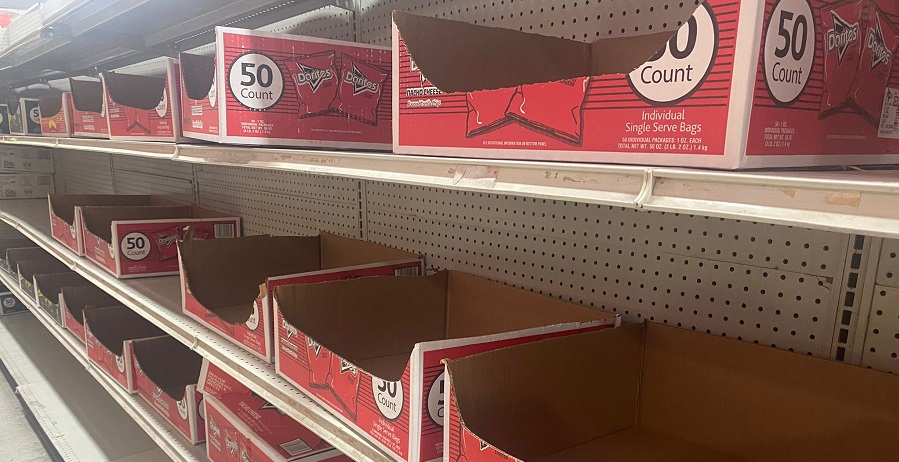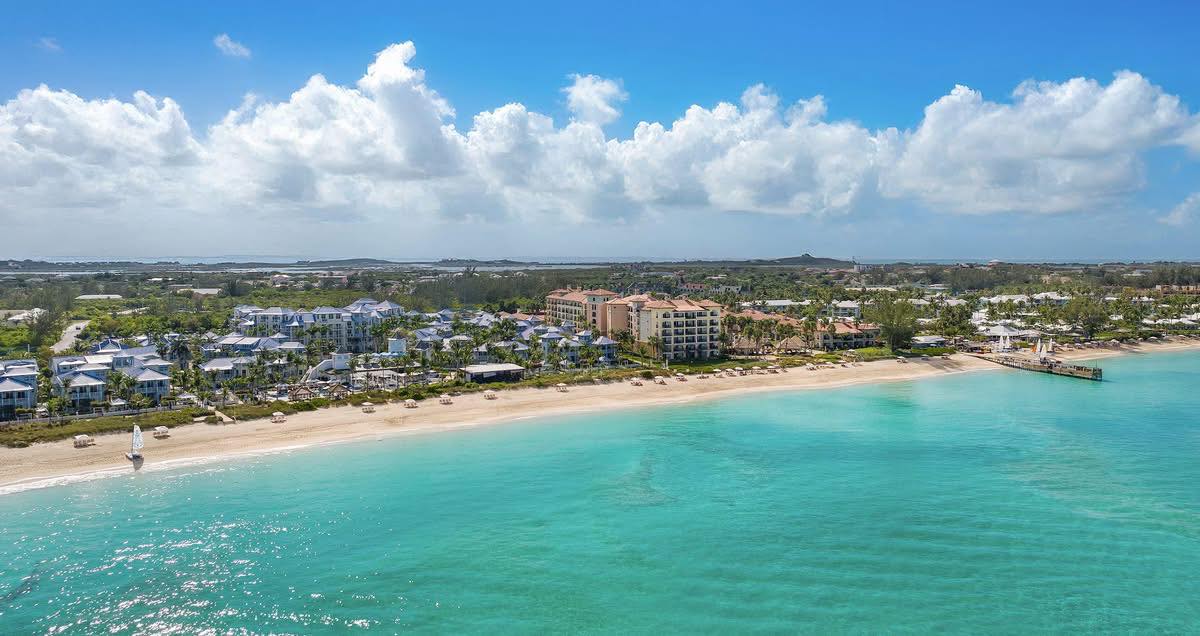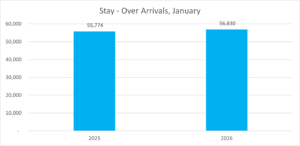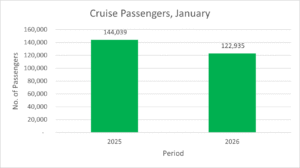By Deandrea Hamilton
Editor
#TurksandCaicos, April 15, 2022 – TCI Government will have to accelerate its reassessment plans when it comes to the $15 million Food and Fuel Tax Break because currently the drop in Customs Processing Fee (CPF) is only giving consumers pennies, if anything, in savings on grocery items. The reason, a rocketing inflation rate.
Prices on goods around the world are escalating rapidly and making matters worse, shipping costs are also marked up; not good for the Turks and Caicos which is heavily dependent upon imports.
GROCERIES
Since the start of April, shippers have been passing along the higher costs of doing business. Staple food items are more expensive and scarce. Magnetic Media observed empty shelves in several popular grocery stores in the Turks and Caicos; it was extremely concerning.
“It is still very difficult getting products in; we are trying,” explained a produce manager.
The current 2.5 per cent break on the CPF, is working but only to soften the blow on constantly rising levels of inflation; it means the government will have to go back to the drawing board.
Covid-19, shipping delays, lockdowns, quarantine orders, anti-vaccine protests, even the US stimulus to citizens which is financing extreme shopping are all blamed for the inflation; a perfect storm of events which has brought this pressure upon households now having to take on unbearable financial burdens and the Turks and Caicos is no exception.
The Russian-led war on the Ukraine has exacerbated the predicament.
We visited Sunny Foods store, with four grocery outlets in Provo and Grand Turk, where the decision has been to put the regular price and the reduced price on the same sticker. With the CPF applied, shoppers are saving only between one and four cents on popular grocery items.
Graceway Supermarkets decided to apply the CPF tax break on everything at the start of April; the company which owns three grocery stores in Providenciales and one food store in Grand Turk, informed that changes on price tags will come later, the savings will reflect at the cash register for now.
Sam’s Club in Providenciales is dropping prices by three per cent across the board at the register. Gus, the owner, is prepared to take a loss in order to simplify the process and attract shoppers.
P&K Spendless Supermarkets said their new stock will reflect the CPF discount, but no new stock is in store as yet.
Our news organization has been informed there has been no engagement by the Government with most of these food stores.
We are also told that every day, notices are coming from suppliers about increases in costs on the popular goods. Meanwhile, the rising cost of living signals that it is time for workers to get a raise.
Government has been able to tap into the public purse to augment salaries and other public service payouts by $30 million this fiscal year. The private sector has no such luxury.
National Insurance Board payments have increased since the start of April; another cost factor which is neutralizing the impact of the Government’s $500 Inflation Stimulus and the Food & Fuel Tax Break.
The recommendation from the grocers, when Magnetic Media quizzed them about a possible solution: ‘for a few months, as was done during the height of the Coronavirus Pandemic, drop the duty completely on bread basket items.
ELECTRICITY
There will be no reprieve in electricity bills either; FortisTCI has delivered a three pronged message namely: the company’s efforts to become less fuel dependent; consumer advice encouraging energy conservation and the inescapable reality of surging oil prices which have now topped $100 per barrel.
company’s efforts to become less fuel dependent; consumer advice encouraging energy conservation and the inescapable reality of surging oil prices which have now topped $100 per barrel.
The TCI’s electricity provider explained despite negotiations for better fuel rates, its supplier, Sun Oil has communicated that the Ukraine crisis will continue to drive up, oil prices.
“We have certainly been in discussions with our supplier and they do have inventory that is currently on hand, that does have the full Customs Processing Fee, CPF included already that has to be exhausted before that reduced Customs Processing Fee is then passed on to FortisTCI, which will flow through the customer bills,” said Aisha Laporte, VP of Finance at FortisTCI during an April 8 episode of Expressions radio show which is hosted by Robert Hall. “…but from the projections that we have we are expected to the see the reduction in the customs processing fee by May.
But I also want to say Mr. Hall, while that 2.5 per cent customs processing fee will be reflected, we’re also seeing an even larger marginal increase on just the cost of fuel. So that will outweigh the reduction from the savings on the Customs Processing Fee.”
FUEL
The report is equally as grim from TCI fuel suppliers.
McAllister Hanchell is Managing Director at Caicos Oil and he communicated early on, that fuel prices are fluctuating so rapidly, it was likely any small reduction would impact prices at the gas pumps.
Hanchell said oil prices are fluctuating, two to three per day in some cases.
This means though the government has come up with a tax break on the customs processing fee and the government’s fuel tax on gas sold at the pumps, it will have no bearing on the cost of the commodity on the open market, or the shipping fees which are also impacted by the pandemic and the conflict in the Ukraine.
Hanchell believes the 85 cents per gallon TCI Government collects on fuel, should be temporarily suspended.
SHIPPING
SEACOR has conveyed three significant rate increases since the start of April. On April 4th the shipping charges were raised due the surge in oil costs per barrel from around $80 to now over $100. Last week, an inland surcharge was passed onto the company; a new fee for shippers out of South Florida related to ground handling and that has resulted in higher charges on imports.
South Florida will apply a 20 per cent inland surcharge for all north and southbound shipments from Miami Dade County, Broward County and Ft Lauderdale.
On April 10, this notice came to SeaCor’s local link, AlServices Ltd: “Please note, effective Sunday, May 1, 2022, the below General Rate Increase (GRI) on the Ocean Freight charge will be applicable on all shipments to/from the United States and Turks & Caicos…”
The month of May is also when Cargo Express and Tropical Shipping will begin to charge more for its transport services. From Carl Simmons, Director there was this response to our queries on the kind of cost adjustments were pending:
“Tropical Shipping/Cargo Express Services can confirm that since the war began in Ukraine there has been an increase in Fuel costs that has impacted the costs of Shipping and Trucking to the Turks and Caicos Islands and other parts of the Caribbean. These increases would obviously be passed onto the customers and will ultimately impact consumers.
As of May 1st, 2022, Cargo Express Services will increase Trucking for Containerized cargo by $50.00 to all its Turks and Caicos customers; mainly due to the rise in fuel costs and replacement parts.”
Government’s around the world are powerless to control the cost of goods, supply chain issues, and despite harsh sanctions Russia continues its deadly, militant incursion of the Ukraine – the only solution is a reduction in government imposed taxes, which Consumers say are happening far too slow and offering cuts which are way too meager.
Meanwhile, since their March 15 national press conference, the TCI Government has issued no statement on the rolling issue.



 News3 days ago
News3 days ago
 News1 week ago
News1 week ago
 Caribbean News4 days ago
Caribbean News4 days ago
 News3 days ago
News3 days ago
































